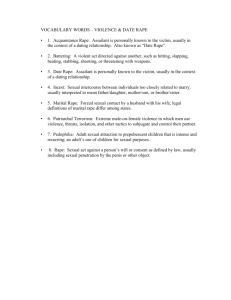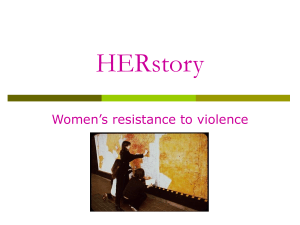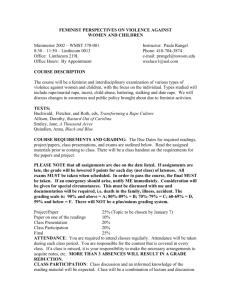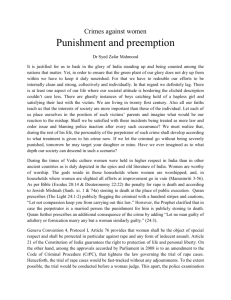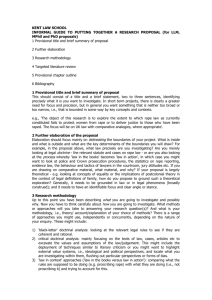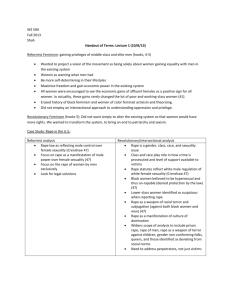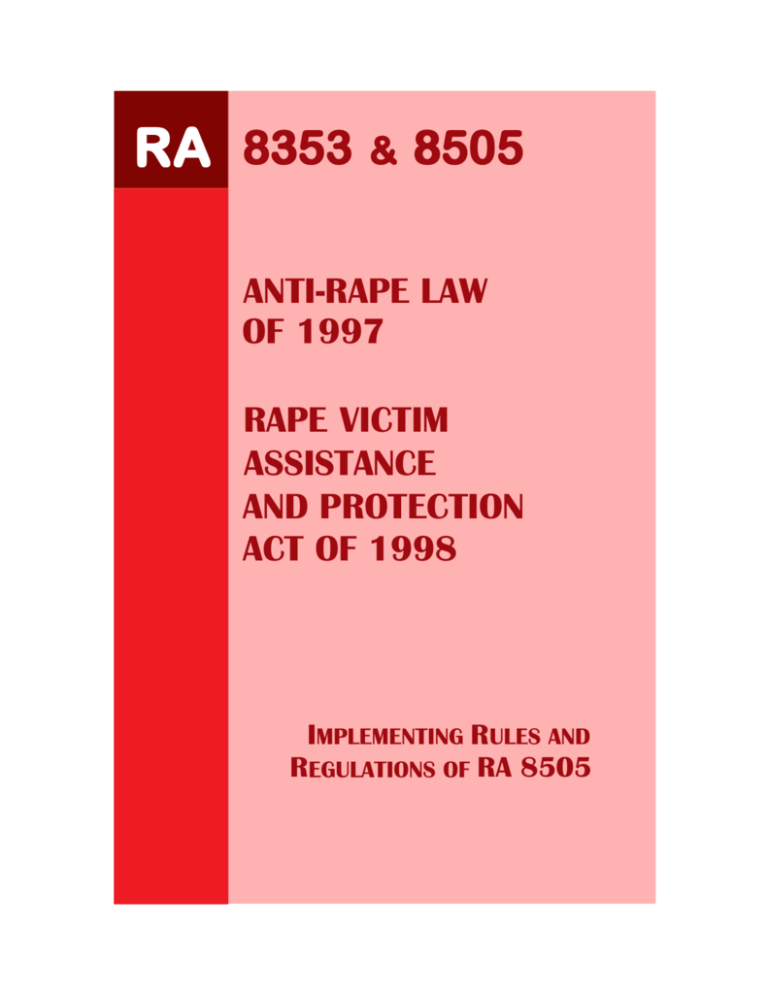
RA 8353 & 8505
ANTI-RAPE LAW
OF 1997
RAPE VICTIM
ASSISTANCE
AND PROTECTION
ACT OF 1998
IMPLEMENTING RULES AND
REGULATIONS OF RA 8505
Published by:
Office of the President
Philippine Commission on Women
1145 J. P. Laurel Street, San Miguel
1005 Manila, Philippines
Copyright: 1997
9th Printing
December 2011
With Funding Assistance from the Office of Senator Pia S. Cayetano
Complimentary copy. Not for sale.
REPUBLIC ACT NO. 8353
Anti-Rape Law of 1997
REPUBLIC ACT NO. 8505
Rape Victim Assistance and
Protection Act of 1998
IMPLEMENTING RULES
AND REGULATIONS OF
REPUBLIC ACT 8505
TABLE OF CONTENTS
REPUBLIC ACT NO. 8353
“The Anti-Rape Law of 1997” ---------------------------------- 1
An Act Expanding the Definition of the Crime of
Rape, Reclassifying the Same as a Crime
Against Persons, Amending for the Purpose of
Act No. 3815, as Amended, Otherwise Known
as the Revised Penal Code, and for Other
Purposes
REPUBLIC ACT NO. 8505
“Rape Victim Assistance and Protection Act of 1998” ----------- 7
An Act Providing Assistance and Protection for
Rape Victims, Establishing for the Purpose a Rape
Crisis Center in Every Province and City,
Authorizing the Appropriation of Funds Therefor,
and for Other Purposes
IMPLEMENTING RULES AND REGULATIONS --------- 12
Tenth Congress
Third Regular Session
Begun and held in Metro Manila, on Monday, the twenty-eighth
day of July, nineteen hundred and ninety-seven.
[ REPUBLIC ACT NO. 8353 ]
AN ACT EXPANDING THE DEFINITION OF THE
CRIME OF RAPE, RECLASSIFYING THE SAME
AS A CRIME AGAINST PERSONS, AMENDING
FOR THE PURPOSE ACT NO. 3815, AS
AMENDED, OTHERWISE KNOWN AS THE
REVISED PENAL CODE, AND FOR OTHER
PURPOSES
SECTION 1. Short Title. – This Act shall be known as
“The Anti-Rape Law of 1997.”
SEC. 2. Rape as a Crime Against Persons. – The crime
of rape shall hereafter be classified as a Crime Against Persons
under Title Eight of Act No. 3815, as amended, otherwise known as
the Revised Penal Code. Accordingly, there shall be incorporated
1
into Title Eight of the same Code a new chapter to be known as
Chapter Three on Rape, to read as follows:
Chapter Three
“Rape
“Article 266-A. Rape; When And How Committed. –
Rape Is Committed –
“1) By a man who shall have carnal knowledge of a woman
under any of the following circumstances:
“a) Through force, threat, or intimidation;
“b) When the offended party is deprived of reason or
otherwise unconscious;
“c) By means of fraudulent machination or grave abuse
of authority; and
“d) When the offended party is under twelve (12) years
of age or is demented, even though none of the
circumstances mentioned above be present.
“2) By any person who, under any of the circumstances
mentioned in paragraph 1 hereof, shall commit an act of sexual
assault by inserting his penis into another person’s mouth or anal
orifice, or any instrument or object, into the genital or anal orifice
of another person.
“Article 266-B. Penalties. – Rape under paragraph 1 of
the next preceding article shall be punished by reclusion perpetua.
2
“Whenever the rape is committed with the use of a deadly
weapon or by two or more persons, the penalty shall be reclusion
perpetua to death.
“When by reason or on the occasion of the rape, the victim
has become insane, the penalty shall be reclusion perpetua to
death.
“When the rape is attempted and a homicide is committed
by reason or on the occasion thereof, the penalty shall be reclusion
perpetua to death.
“When by reason or on the occasion of the rape, homicide
is committed, the penalty shall be death.
“The death penalty shall also be imposed if the crime of
rape is committed with any of the following aggravating/qualifying
circumstances:
“1) When the victim is under eighteen (18) years of age
and the offender is a parent, ascendant, step-parent, guardian, relative
by consanguinity or affinity within the third civil degree, or the
common-law spouse of the parent of the victim;
“2) When the victim is under the custody of the police or
military authorities or any law enforcement or penal institution;
“3) When the rape is committed in full view of the spouse,
parent, any of the children or other relatives within the third civil
degree of consanguinity;
“4) When the victim is a religious engaged in legitimate
religious vocation or calling and is personally known to be such by
the offender before or at the time of the commission of the crime;
3
“5) When the victim is a child below seven (7) years old;
“6) When the offender knows that he is afflicted with
Human Immuno-Deficiency Virus (HIV)/Acquired Immune Deficiency
Syndrome (AIDS) or any other sexually-transmissible disease and
the virus or disease is transmitted to the victim;
“7) When committed by any member of the Armed Forces
of the Philippines or para-military units thereof or the Philippine
National Police or any law enforcement agency or penal institution,
when the offender took advantage of his position to facilitate the
commission of the crime;
“8) When by reason or on the occasion of the rape, the
victim has suffered permanent physical mutilation or disability;
“9) When the offender knew of the pregnancy of the
offended party at the time of the commission of the crime; and
“10) When the offender knew of the mental disability,
emotional disorder and/or physical handicap of the offended party
at the time of the commission of the crime.
“Rape under paragraph 2 of the next preceding article shall
be punished by prision mayor.
“Whenever the rape is committed with the use of a deadly
weapon or by two or more persons, the penalty shall be prision
mayor to reclusion temporal.
“When by reason or on the occasion of the rape, the victim
has become insane, the penalty shall be reclusion temporal.
“When the rape is attempted and a homicide is committed
by reason or on the occasion thereof, the penalty shall be reclusion
temporal to reclusion perpetua.
4
“When by reason or on the occasion of the rape, homicide
is committed, the penalty shall be reclusion perpetua.
“Reclusion temporal shall also be imposed if the rape is
committed with any of the ten aggravating/qualifying circumstances
mentioned in this article.
“Article 266-C. Effect of Pardon. – The subsequent valid
marriage between the offender and the offended party shall extinguish
the criminal action or the penalty imposed.
“In case it is the legal husband who is the offender, the
subsequent forgiveness by the wife as the offended party shall
extinguish the criminal action or the penalty: Provided, That the
crime shall not be extinguished or the penalty shall not be abated if
the marriage is void ab initio.
“Article 266-D. Presumptions. – Any physical overt act
manifesting resistance against the act of rape in any degree from the
offended party, or where the offended party is so situated as to
render her/him incapable of giving valid consent, may be accepted
as evidence in the prosecution of the acts punished under Article
266-A.”
SEC. 3. Separability Clause. – If any part, section, or
provision of this Act is declared invalid or unconstitutional, the other
parts thereof not affected thereby shall remain valid.
SEC. 4. Repealing Clause. – Article 335 of Act No.
3815, as amended, and all laws, acts, presidential decrees, executive
orders, administrative orders, rules and regulations inconsistent with
or contrary to the provisions of this Act are deemed amended,
modified or repealed accordingly.
5
SEC. 5. Effectivity. – This Act shall take effect fifteen
(15) days after completion of its publication in two (2) newspapers
of general circulation.
Approved,
JOSE DE VENECIA, JR.
Speaker of the House
of Representatives
ERNESTO M. MACEDA
President of the Senate
This Act, which is a consolidation of Senate Bill No. 950 and
House Bill No. 6265, was finally passed by the Senate and the
House of Representatives on June 5, 1997 and September 3, 1997,
respectively.
ROBERTO P. NAZARENO
Secretary General
House of Representatives
LORENZO E. LEYNES, JR.
Secretary of the Senate
Approved: September 30, 1997
FIDEL V. RAMOS
President of the Philippines
6
Tenth Congress
Third Regular Session
Begun and held in Metro Manila, on Monday, the twenty-eighth
day of July, nineteen hundred and ninety-seven.
[ REPUBLIC ACT NO. 8505]
AN ACT PROVIDING ASSISTANCE AND
PROTECTION FOR RAPE VICTIMS,
ESTABLISHING FOR THE PURPOSE A
RAPE CRISIS CENTER IN EVERY
PROVINCE AND CITY, AUTHORIZING
THE
APPROPRIATION
OF
FUNDS
THEREFOR, AND FOR OTHER PURPOSES
Be it enacted by the Senate and House of Representatives
of the Philippines in Congress assembled:
SECTION 1. Tile. — This Act shall be known as the
“Rape Victim Assistance and Protection Act of 1998.”
SEC. 2. Declaration of Policy. — It is hereby declared
the policy of the State to provide necessary assistance and protection
for rape victims. Toward this end, the government shall coordinate
its various agencies and non-government organizations to work hand
in hand for the establishment and operation of a rape crisis center
in every province and city that shall assist and protect rape victims
in the litigation of their cases and their recovery.
7
SEC. 3. Rape Crisis Center. — The Department of Social
Welfare and Development (DSWD), the Department of Health
(DOH), the Department of the Interior and Local Government
(DILG), the Department of Justice (DOJ), and a lead nongovernment organization (NGO) with proven track record or
experience in handling sexual abuse cases, shall establish in every
province and city a rape crisis center located in a government hospital
or health clinic or in any other suitable place for the purpose of:
(a) Providing rape victims with psychological counselling,
medical and health services, including their medico-legal examination;
(b) Securing free legal assistance or service, when necessary,
for rape victims;
(c) Assisting rape victims in the investigation to hasten the
arrest of offenders and the filing of cases in court;
(d) Ensuring the privacy and safety of rape victims;
(e) Providing psychological counseling and medical services
when necessary for the family of rape victims;
(f) Developing and undertaking a training program for law
enforcement officers, public prosecutors, lawyers, medico-legal
officers, social workers, and barangay officials on human rights and
responsibilities; gender sensitivity and legal management of rape
cases; and
(g) Adopting and implementing programs for the recovery
of rape victims.
The DSWD shall be the lead agency in the establishment
and operation of the Rape Crisis Center.
8
SEC. 4. Duty of the Police Officer. — Upon receipt by
the police of the complaint for rape, it shall be the duty of the police
officer to:
(a) Immediately refer the case to the prosecutor for inquest/
investigation if the accused is detained; otherwise, the rules of court
shall apply;
(b) Arrange for counselling and medical services for the
offended party; and
(c) Immediately make a report on the action taken.
It shall be the duty of the police officer or the examining
physician, who must be of the same gender as the offended party,
to ensure that only persons expressly authorized by the offended
party shall be allowed inside the room where the investigation or
medical or physical examination is being conducted.
For this purpose, a women’s desk must be established in
every police precinct throughout the country to provide a police
woman to conduct investigation of complaints of women rape victims.
In the same manner, the preliminary investigation proper or inquest
of women rape victims must be assigned to female prosecutor or
prosecutors after the police shall have endorsed all the pertinent
papers thereof to the same office.
SEC. 5. Protective Measures. — At any stage of the
investigation, prosecution and trial of a complaint for rape, the police
officer, the prosecutor, the court and its officers, as well as the
parties to the complaint shall recognize the right to privacy of the
offended party and the accused. Towards this end, the police officer,
prosecutor, or the court to whom the complaint has been referred
may, whenever necessary to ensure fair and impartial proceedings,
and after considering all circumstances for the best interest of the
parties, order a closed-door investigation, prosecution or trial and
9
that the name and personal circumstances of the offended party
and/or the accused, or any other information tending to establish
their identities, and such circumstances or information on the complaint
shall not be disclosed to the public.
The investigating officer or prosecutor shall inform the parties
that the proceedings can be conducted in a language or dialect
known or familiar to them.
SEC. 6. Rape Shield. — In prosecutions for rape, evidence
of complainant’s past sexual conduct, opinion thereof or of his/her
reputation shall not be admitted unless, and only to the extent that
the court finds, that such evidence is material and relevant to the
case.
SEC. 7. Appropriations. — For the establishment and
operation of the rape crisis centers during the first year of
implementation of this Act, the amount of One hundred twenty
million pesos (P120,000,000.00) shall be charged against the
Organizational Adjustment Fund, as follows: Sixty million pesos
(P60,000,000.00) for the DSWD; and Twenty million pesos
(P20,000,000.00) each for the DOH, DILG, and DOJ, respectively.
Thereafter, the necessary amount for the rape crisis centers shall be
included in the budgetary allocations for the agencies concerned in
the annual General Appropriations Act.
SEC. 8. Implementing Rules and Regulations. — Within
ninety (90) days upon the approval of this Act, all concerned agencies
shall formulate rules and regulations as may be necessary for the
proper implementation thereof.
SEC. 9. Separability Clause. — If any part, section or
provision of this Act is declared invalid or unconstitutional, the other
parts thereof not affected thereby shall remain valid.
10
SEC. 10. Repealing Clause. — All laws, acts, presidential
decrees, executive orders, administrative orders, rules and regulations
inconsistent with or contrary to the provisions of this Act are deemed
amended, modified or repealed accordingly.
SEC. 11. Effectivity. — This Act shall take effect fifteen
(15) days after completion of its publication in at least two (2)
newspapers of general circulation.
Approved,
JOSE DE VENECIA, JR.
Speaker of the House
of Representatives
NEPTALI A. GONZALES
President of the Senate
This Act, which is a consolidation of Senate Bill No. 2280
and House Bill No. 9962 was finally passed by the Senate and the
House of Representatives on February 4,1998 and February 5,1998,
respectively.
ROBERTO P. NAZARENO
Secretary General
House of Representatives
HEZEL P. GACUTAN
Secretary of the Senate
Approved,
February 13, 1998
FIDEL V. RAMOS
President of the Philippines
11
Republic of the Philippines
NATIONAL ECONOMIC AND
DEVELOPMENT AUTHORITY
Neda sa Pasig, 12 Blessed Josemaria Escriva Drive
Ortigas Center, Pasig City 1605
SOCIAL DEVELOPMENT COMMITTEE
Resolution No. 1 (Series of 2002)
Approving the Implementing Rules and Regulations (IRR) of
Republic Act (RA) 8505, Providing Assistance and Protection
for Rape Victims, Establishing for the Purposes, A Rape Crisis
Center in Every Province and City
WHEREAS, the Philippine Constitution values the dignity of
the human being and guarantees full respect for human rights;
WHEREAS, RA 8353 has been enacted to expand the
definition of the crime of rape as a crime against persons, amending
for the purpose RA 3815, as amended, other known as the Revised
Penal Code;
WHEREAS, RA 8505 has been enacted to establish and
operate a rape crisis center in every province and city that shall
protect and assist rape survivors in the litigation of their cases in
their recovery;
WHEREAS, the government shall coordinate its various
agencies and collaborate with non-government organizations (NGO’s)
to work hand in hand for the establishment and operation of such
centers;
WHEREAS, the draft IRR on RA 8505 was formulated by
a Committe headed by the Department of Social Welfare and
Development (DSWD), and participated in by the Department of
Health (DOH), Department of Interior and Local Government
12
(DILG), Department of Justice (DOJ), National Commission on the
Role of Filipino Women (NCRFW), Philippine National Police
(PNP), Women’s Legal Bureau, Third World Movement Against
the Exploitation of Women, Women Crisis Center and the Kalakasan
Foundation Incorporated;
WHEREAS, the comments of the members of the Social
Development Committe were already considered in the attached
draft IRR;
NOW, THEREFORE, BE IT RESOLVED, AS IT IS
HEREBY RESOLVED, by the Chairman and the members of the
NEDA Board’s Social Development Committee (SDC) - Cabinet
Level, to approve and adopt the Implementing Rules and Regulations
(IRR) of RA 8505.
Approved this 7th day of February 2002 at NEDA sa
Pasig, Pasig City.
HON. PATRICIA A. STO TOMAS
HON. DANTE B. CANLAS
Secretary, Department of Labor
and Employment
Chairman, Social Development CommitteeCabinet Level/Cabinet Cluster C
Secretary for Socio-Economic
Planning Co-Chair, Social
Development Committe-Cabinet
Level/Cabinet Cluster C
HON. ALBERTO G. ROMULO
HON. CORAZON JULIANO-SOLIMAN
Executive Secretary
Secretary
Department of Social Welfare and
HON. RAUL S. ROCO
HON. MANUEL M. DAYRIT
Secretary
Department of Education
Secretary
Department of Health
13
HON. JOEY D. LINA
HON. LEONARDO Q. MONTEMAYOR
Secretary
Department of Interior and Local
Government
Secretary
Department of Agriculture
HON. HERNAN A. BRAGANZA
HON. TERESITA QUINTOS-DELES
Secretary
Department of Agrarian Reform
Secretary
National Anti-Poverty Commission
HON. ESTER A. GARCIA
HON. MICHAEL T. DEFENSOR
Chairperson
Commission on Higher Education
Chairperson
Housing and Urban Development
Coordinating Council
HON. LUCITA S. LAZO
Deputy Director-General
Technical Education and Skills Development Authority
14
RULES AND REGULATIONS IMPLEMENTING
REPUBLIC ACT. NO. 8505,OTHERWISE KNOWN AS
THE “RAPE VICTIMS ASSISTANCE AND
PROTECTION ACT 0F 1998”
PURSUANT TO SECTION 8 OR RA NO. 8505, AN
ACT PROVIDING ASSISTANCE AND PROTECTION FOR
RAPE VICTIMS, ESTABLISHING FOR THE PURPOSE, A
RAPE CRISIS CENTER IN EVERY PROVINCE AND CITY,
THE FOLLOWING RULES AND REGULATIONS ARE
HEREBY ISSUED:
RULE 1
POLICY AND APPLICATION
SECTION 1. PURPOSE AND OBJECTIVES. These
rules and regulations seek to implement the declared policy of the
State to provide necessary assistance and protection for rape
survivors by the establishment and operation of a rape crisis center
in every province and city that shall protect and assist rape survivors
in the litigation of their cases and in their recovery.
For this purpose, the government shall coordinate its various
agencies and collaborate with non-government organizations to work
hand in hand for the establishment and operation of such centers.
SECTION 2. MANDATE AND RESPONSIBLE
AGENCIES. The Department of Social Welfare and Development
(DSWD), the Department of Health (DOH), the Department of the
Interior and Local Government (DILG), the Department of Justice
(DOJ), and a lead non-government organization (NGO) with proven
track record or experience in handling sexual abuse cases, shall
establish in every province and city a rape crisis center located in
any suitable place, or in a government hospital or health clinic. The
15
DSWD shall be the lead agency in the establishment and operation
of a rape crisis center.
SECTION 3. DEFINITION OF TERMS. a.Rape shall be defined pursuant to Article 266-A of the
Revised Penal Code, as amended by RA 8353, as a crime against
persons committed as follows:
1. by a man who shall have carnal knowledge of a woman
under any of the following circumstances:
i.
through force, threat, or intimidation;
ii. when the offended party is deprived of reason or
otherwise unconscious;
iii. by means of fraudulent machinations or grave abuse
of authority; and
iv. when the offended party is under twelve (12) years
of age or is demented, even though none of the
circumstances mentioned above be present.
2. by any person who, under any of the circumstances
mentioned in paragraph 1 hereof, shall commit an act of
sexual assault by inserting his penis into another person’s
mouth or anal orifice, or any instrument or object, into
genital or anal orifice of another person.
b. Rape Victim shall refer to the offended party, male or
female, minor or adult who has been a victim of rape as defined
above. Rape victim shall also be known as rape survivor.
16
c.Rape Crisis Center shall refer to a facility where a
comprehensive network of services and support activities are available
in a particular province or city to victims of rape and other forms
of sexual abuse, their family and the community, in general, including
programs for sexual assault awareness and prevention. The Rape
Crisis Center will be established in areas where there are high
incidences of rape cases. It may be located in any suitable place
or government hospital or health clinic and will be established by
creating or upgrading existing facilities or by establishing or building
upon existing networks providing support and assistance to victims
of rape (and other forms of sexual abuse). The center may be
known by some other name to prevent stigmatization of the survivor.
d.Police Officer shall refer to any law enforcement agent of
the Philippines National Police (PNP), the National Bureau of
Investigation (NBI) or other law enforcement agencies.
RULE 2
ESTABLISHMENT AND OPERATION OF RAPE
CRISIS CENTERS
SECTION 4. FUNCTIONS OF A RAPE CRISIS
CENTER. A rape crisis center shall have the following functions:
a. provide victims of rape and other forms of sexual abuse
with psychological counseling, medical and health services, including
their medico-legal examination;
b. secure free legal assistance or service, when necessary,
for victims of rape and other forms of sexual abuse;
c. assist victims of rape and other forms of sexual abuse in
evidence gathering and in the investigation to hasten the arrest of
offenders and filing of cases in court;
17
d. ensure the privacy and safety of victims of rape;
e. provide psychological counseling and medical services
whenever necessary for the family of victims of rape and other
forms of sexual abuse;
f. adopt and implement programs that are survivor-sensitive
for the recovery of victims of rape and other forms of sexual abuse;
g. assist the government in raising public awareness on rape
and other forms of sexual abuse and encourage volunteerism and
the participation of the various sectors of the country for increased
individual and community safety awareness;
h. develop a referral system that would be made available
based on need of the survivors, such as temporary shelter, education
and skills training;
SECTION 5. COMPOSITION OF STAFF AT RAPE
CRISIS CENTER. As a network of services, the rape crisis center
shall be comprised of the following who will form the core staff of
the network who shall be on call and shall act jointly in providing
full support and assistance to rape survivors at any time and in every
step of the process, namely:
a. social workers or crisis workers who shall respond to the
counseling and psycho-social needs of survivors, among others,
who may be drawn from the DSWD, LGUs or from any participating
NGO;
b. physicians who shall conduct medico-legal examinations
and provide treatment to injuries and diseases related to the rape;
18
c. psychologists or psychiatrists who shall provide
psychological counseling and psychiatric services, whenever
necessary, to the victims;
d. police officers who shall conduct the investigation, ensure
the gathering of evidence material to the case, ensure the speedy
arrest of offenders and the filing of cases in court as well as provide
security to victims, witnesses, counselors and social workers, where
the circumstances of threat merit such police security. The barangay
wherein the threatened victim, witnesses, counselors and social
workers reside may also assist in providing such security;
e. prosecutors or lawyers who shall facilitate the litigation of
the rape cases that are filed;
f. NGO representatives who shall, among others, conduct
awareness raising and advocacy activities.
SECTION 6. DUTIES AND RESPONSIBILITIES OF
MANDATED AGENCIES AND NGO PARTNERS. The
mandated agencies such as DSWD, DOH, DOH, DILG, and NGO
lead agency shall perform the following functions and responsibilities:
Department of Social Welfare and Development (DSWD)
•
Provide support services to rape victims and their
families such as residential service (e.g. Haven for
Women, Substitute Home Care for Women and Group
Home for Girls) and community-based service.
• Establish linkage with the academe and all NGOs for
the necessary support services to rape victims/survivors
and their families.
19
• Conduct training to Social Workers and other service
providers for the effective operation and management of
Rape Crisis Centers.
•
Conduct of training for counselors on basic approaches
in dealing with victims of rape.
•
Provide technical assistance to local government units
for the operation and maintenance of Rape Crisis Center.
•
Develop programs that facilitate the recovery of rape
survivors and other support interventions.
Department of Health (DOH)
•
Provide a space at the Regional Hospitals for the Rape
Crisis Centers.
•
Provide immediate medical assistance to victims of rape.
•
Develop and adopt uniform medical examination
procedures including the accomplishment of forms/
report, such as the conduct of physical examination
within 48 hours.
•
Conduct training to examining physicians and other health
workers on gender sensitivity core messages in the
training of medical and health professionals.
•
Ensure both the validity and confidentiality of the medical
records required in cases of litigation.
Department of Interior and Local Government (DILG)
20
•
Establish Women’s Desk in every precinct throughout
the country authorized among others to conduct
investigation of rape cases through the Philippine
National Police (PNP).
•
Conduct training to law enforcement officers and
barangay officials on human rights, gender sensitivity
and legal management of rape cases in coordination
with appropriate officer/agencies.
•
Provide support to LGUs to assist victims of rape and
to ensure the sustainability of such services.
•
Issue a memorandum order to LGUs to support the
establishment of rape crisis centers in every province/
city.
Department of Justice (DOJ)
•
Ensure speedy disposition of rape cases.
•
Ensure the efficiency of legal services supporting the
free legal assistance to victims of rape.
•
Conduct training of prosecutors and other officers at the
justice system
Lead Non-Government Agency
•
Conduct public information/dissemination.
•
Assist in the development and implementation of training
programs for law enforcers, prosecutors, social
workers, physicians and other health workers, barangay
officials, etc.
21
•
Advocate for community-based programs supporting for
victims of rape and their families.
•
Advocate for the elimination of all forms of violence
against women and children
RULE 3
DUTIES AND RESPONSIBILITIES OF THE
INVESTIGATING POLICE OFFICER, EXAMINING
PHYSICIAN, PROSECUTOR AND SOCIAL WORKER
OR CRISIS WORKERS
SECTION
7.
COMMON
DUTIES
AND
RESPONSIBILITIES OF THE INVESTIGATING POLICE
OFFICER, EXAMINING PHYSICIAN, PROSECUTOR,
SOCIAL WORKERS, OR CRISIS WORKERS. a. respect the rights and dignity of the survivors as a person;
b. arrange for psychological counseling of rape victims and
survivors by a trained and qualified counselor;
c. arrange for the medical examination of the offended party
by a trained and qualified physician and further medical services;
d. refer the case to the Women’s Desk of a precinct or
agency;
e. refer the survivor for legal services if he or she decides
to file a case;
f. inform the survivor of the range of his or her options;
22
g. ensure the information regarding the survivor and his/her
circumstances are kept confidential; and
h. undergo training and other capacity development programs
on, but not limited to, the following: trainings on gender sensitivity,
gender sensitive counseling, human rights and women and children
rights and legal management of rape cases.
SECTION
8.
SPECIFIC
DUTIES
AND
RESPONSIBILITIES OF THE INVESTIGATING POLICE
OFFICER. a. immediately refer the case to the Women’s Desk of the
precinct, or any other concerned agency such as Local DSWD,
DOJ, and NGO handling the cases;
b. immediately refer the case to a prosecutor for inquest, if
the accused is detained of for preliminary investigation, if the accused
is at large;
c. provide security to the survivors of rape, witnesses and
service providers; and
d. ensure that the evidence gathered on the case are
safeguarded.
SECTION
9.
SPECIFIC
DUTIES
RESPONSIBILITIES OF THE PROSECUTOR. -
AND
a. A prosecutor who is preferably of the same sex as the
victim or to a gender sensitive prosecutor if the former is not present
or available, shall conduct the inquest or preliminary investigation.
23
•
Informing the rape survivor of his or her rights and what
to expect in the legal process;
•
Filing of the information against the offender including the
discharge of a suspected offender to become a state
witness;
•
Informing the rape survivor of the detention status of the
accused pending trial, i.e., the rape survivor shall be
informed beforehand of the release of the accused;
• Scheduling of each court proceeding that the rape survivor
is required to attend; and
• Accepting a plea of guilt by the accused or the promulgation
of judgement in the rape case;
b. Present during trial, the admission of evidence of the victim’s
past sexual conduct, opinion thereof, or reputation;
c. Ensure that the inquest of preliminary investigation and trial
shall be conducted in a language or dialect that is known or familiar
to the victim;
d. Exert utmost efforts to prevent delay in the preliminary
investigation and trial of the rape case; and
e. Not to divulge to the public the name, address and any
other information or circumstances tending to establish the identity of
the victim. Moreover, the public shall be barred during the conduct
of the inquest or preliminary investigation if it will serve the best
interests of the victim
24
SECTION 10.
SPECIFIC DUTIES AND
RESPONSIBILITIES OF THE EXAMINING PHYSICIAN. a. Before Examination:
•
Ensure that the medico-legal examination shall be
conducted
by a woman, or if unavailable, in the presence of a duly
authorized woman;
• Ensure that the only person(s) expressly authorized by
the
rape survivor are allowed inside the examination room.
b. During Examination:
• Conduct a speedy and thorough examination of the
survivor so that humiliation as a result of repetitious
procedures may be minimized; and
• Treat the victim with gentleness and utmost respect.
c. After Examination:
•
Prepare an official Medico-Legal Report based on the
findings of the examination ensuring that it is duly
endorsed by the Chief and the Director of the MedicoLegal Division or duly authorized representative with its
corresponding case number. The Medico-Legal Report
is prepared within two or three days unless other
requirements are requested like x-ray, pregnancy test,
ultrasound and others which would take a longer period
of medical analysis; and
25
•
Prepare and issue an initial report if there is an immediate
need for the Medico-Legal Report, e.g. the suspect is
detained.
d. Post Examination Assistance
•
Refer all cases of rape to the rape crisis center or other
government organization concerned, or to the hospital
of choice for medical attention and counseling if not yet
referred; and
•
Appear and testify in court as an expert witness on the
case.
SECTION 11.
SPECIFIC DUTIES AND
RESPONSIBILITIES OF THE SOCIAL WORKER OR CRISIS
WORKER a. Assess the cases of rape survivors received in the center;
b. Define the problems to be worked on and set an
agreement with the survivors consistent with the functions of the
rape crisis centers;
c. Formulate treatment plans with the rape survivors including
her family consistent with the functions of the rape crisis centers;
d. Organize and direct the interdisciplinary team in the center
towards a holistic approach for the healing, recovery and reintegration
of the rape survivors;
e. Conduct stress management and other appropriate
interventions to the rape survivors towards resolving trauma brought
about by the experience;
26
f. Network with the five pillars of the justice system to link
the survivors to appropriate resources in response to identified needs;
g. Evaluate the progress of the rape survivors according to
the treatment plans formulated;
h. Terminate the helping relationship after attainment of the
treatment plans; and
i. Ensure social reintegration of rape survivors in their family
and community.
RULE 4
ASSISTANCE FOR THE RECOVERY OF RAPE
SURVIVORS
SECTION 12. HEALING, RECOVER, AND
REINTEGRAITON OF RAPE SURVIVORS. a. A healing recovery, and reintegration program for rape
survivors shall be adopted and consistently implemented by all rape
crisis centers. Underlying said program should be the following:
•
that rape is a stress causing circumstance that tests the
capacity of the individual, and therefore, rape survivors
should be provided full support and understanding. It
shall be a policy that the credibility and character of the
survivor shall not be questioned as the victim should
never be blamed for the rape that occurred;
•
that the therapeutic applications should focus on helping
the survivor’s return to her or his previous level of
adaptation. The primary goal of interventions therefore
facilitate the survivor’s reintegration;
27
•
that the therapeutic applications should increase the
survivor’s capacity to adopt and maintain control since
rape produces helplessness, feelings of vulnerability, fear,
deception and humiliation;
•
that confidentiality should be maintained by the service
providers. They should assure the survivors that they
can withhold information and feelings about the abuse
from significant persons in their lives for this may disrupt
relationships;
•
that the service providers should sensitize the family and
friends of rape survivors to the meaning of rape so they
can support the survivor; and
that counseling for the immediate family members of the
survivors is necessary to avoid criticizing or blaming the
survivor.
•
b. Upon the assessment of a duly authorized psychologist
or psychiatrist, psycho-therapy shall be provided to the victim; and
c. Rape survivors should be informed of the range of their
options, the advantages and disadvantages of each one of their
options, the challenges and all the possible consequences of their
options so that they could make sound decisions.
SECTION
13.
REHABILITATION
OF
PERPETRATORS. A referral system shall be established for services
to the perpetrators to prevent occurrences of incidences of rape.
RULE 5
CONFIDENTIALITY AND THE PRIVACY OF RAPE
SURVIVORS
28
SECTION 14. CONFIDENTIALITY OF RAPE CASES
a. Only persons expressly authorized by the offended party
shall be allowed inside the room where the investigation, medical or
physical examination is being conducted. Appropriate protocols
shall be developed and observed at any stage of the investigation,
prosecution and trial of rape cases;
b. The police officer, prosecutor and the court shall ensure
fair and impartial proceedings, and in consideration of the best
interest of both parties, shall order closed door investigation,
prosecution or trial;
c. All hearings in rape cases shall be made confidential and
shall not be open to the public unless ordered by the court. All
records, books and papers relating to the case in the files of the
court, of the mandated agencies and of any other agency or institution
participating in the rape case proceedings shall be kept strictly
confidential; and
d. Service providers or other personnel involved in the
handling or rape cases who have been found guilty of violating any
provision of RA 8505 and its IRR shall be subject to administrative
and/or criminal liability
SECTION 15. RIGHT TO PRIVACY. a. At any stage of the investigation, prosecution and trial of
a complaint for rape, the police officer, prosecutor, and the court
and its officers, shall recognize the right to privacy of the offended
party and the accused as guaranteed by the Constitution;
29
b. The name or personal circumstance of the offended
party and the accused or any information which would tend to
establish the identity of the rape victim shall not be disclosed to the
public; and
c. Medical reporting of rape cases shall be limited to the
basic facts of the case and devoid of sensationalism. The name and
address of the survivor and other information tending to establish
her or his identity shall not be included in the report unless the
survivor gives his or her consent in writing. Any violation of this
provision shall render the reporter or columnist as well as the editor
and publisher, in the case of printed material, or the newscaster or
reporter, or director and producer, in the case of television and
radio broadcasts, solidarily liable for damages.
RULE 6
BUDGET AND FINAL PROVISIONS
SECTION 16. BUDGET APPROPRIATIONS. a. Each of the mandated agencies shall be provided with
abudgetfortheimplementationandoperationoftherapecrisiscenters,
which shall be included in the budgetary allocations for the agencies
concerned in the annual General Appropriations Act.
b. For the first year of implementation, any of the following
may be considered for priority funding:
• advocacy and public information on RA 8505 and related
laws e.g. RA 8353, PNP Law, speedy Trial Law;
•orientationamongconcernedgovernmentofficialsincluding
local government executives on RA 8505 and its program
requirements;
30
• gender sensitivity and other related training on violence
against women and children to have a common framework
in addressing violence against women and children;
• training for service providers to acquire necessary skills
to handle rape cases; and
• assessment and improvement of existing service facilities
and resources and determining the requirements for
upgrading them into Rape Crisis Centers.
c. Succeeding appropriations shall be based on the specific
duties and responsibilities, goals and targets of mandated agencies
for the operation and maintenance of rape crisis centers. Priority of
funding requirements shall be based on sustainability, incidence of
cases, and existence of centers. Such shall also be included in the
agency budget allocations to be covered by the annual General
Appropriation Act (GAA).
d.Consistentwithexistinggovernmentregulations,fundssupport
to partner non-government organizations shall be provided for the
operation and maintenance of Rape Crisis Center.
SECTION17. EFFECTIVITY. Theserulesandregulations
shall take effect fifteen (15) days after publication.
31
Office of the President
Philippine Commission on Women
1145 J. P. Laurel St., San Miguel
1005 Manila, Philippines
Telephone Nos. 7354955, 7358509; Facsimile No. 7364449
Website: www.pcw.gov.ph
EMail: edo@pcw.gov.ph, irmd@pcw.gov.ph

